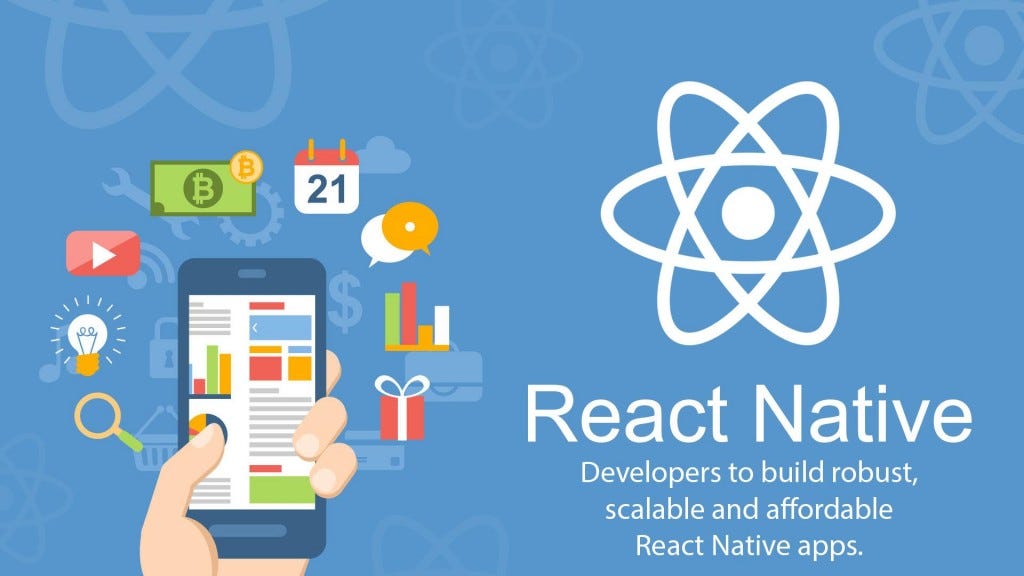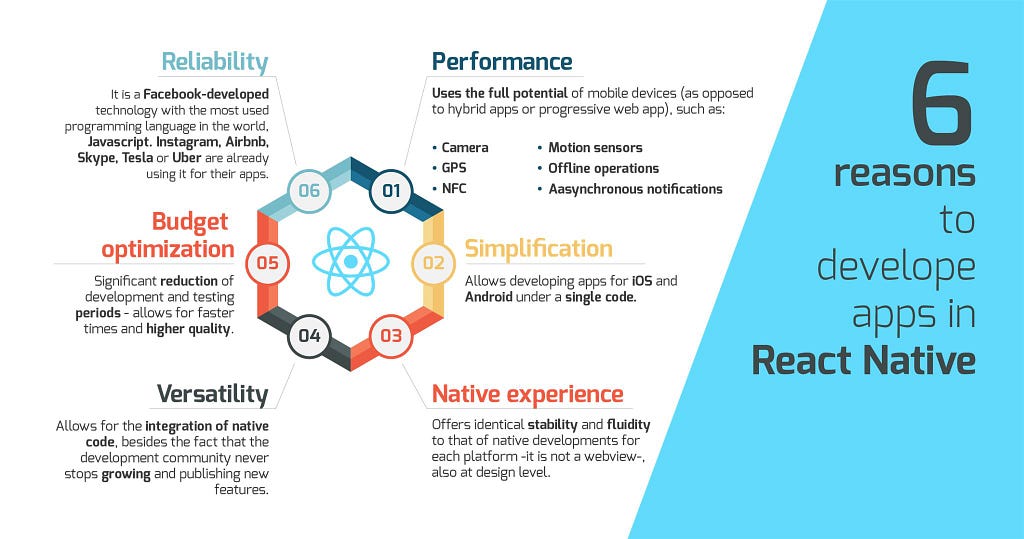Latest news about Bitcoin and all cryptocurrencies. Your daily crypto news habit.
 Source: Bacancy TechnologyIf you’re considering taking on a new mobile project, use React Native — you won’t regret it. Are looking to hire react native developer for your project? Here are 3 major React Native advantages!
Source: Bacancy TechnologyIf you’re considering taking on a new mobile project, use React Native — you won’t regret it. Are looking to hire react native developer for your project? Here are 3 major React Native advantages!1. BIG TECH GIANTS ARE USING REACT NATIVE
Check out this detailed post “Migrating To React Native: Top Case Studies From Well-Known Companies” about how did Walmart, Bloomberg, Airbnb and other big brands utilize React Native advantages.
Below are few of the advantages of React Native:
Productivity:
- 95% of the codebase is shared between iOS and Android;
- No knowledge sharing required, as each feature is implemented by a single team.
Code Sharing:
- Front-end/Presentation code can be shared between iOS and Android;
- Business logic can be shared with Web applications as well;
- Lots of code re-usability between platforms.
App-store approval:
- No need to go through the app store approval process. You can host the bundle on your own server and do over-the-air updates.
Time-to-market:
- Very fast;
- You have control over the release dates;
- Both platforms can be released on the same day and time.
Performance:
- React Native provides the nearly identical performance to native.
Animations:
- React Native provides extremely smooth animations because the code is converted to native views before rendering.
UX:
- You can have platform-specific UI design.
Automation:
- Same automation suite can run on both iOS and Android.
2. MOST POPULAR PROGRAMMING LANGUAGE IN THE WORLD
React Native is written in JavaScript. For the fifth year in a row, JavaScript is the most commonly used programming language in the world, according to the Stack Overflow Developer Survey 2017 (36,625 responses primarily from the USA).
3. MOST POPULAR CROSS-PLATFORM FRAMEWORK FOR MOBILE APP DEVELOPMENT
Developer experience is awesome. React developers get significantly faster feedback during development than compared to traditional approaches because they don’t need to restart their packager to see every little change. With React Native a mobile app can be developed for Android and iOS both.
When you’re looking to build a mobile app for your startup, you come across lots of options and thoughts in your mind to build a mobile app for your venture. And that continues to pop-up till the time you get the most convincing solution that satisfies your business goals, needs, and, preferences.
Generally speaking, there are 3 ways to build a mobile app:
1. Native App Development2. Hybrid App Development3. Mobile Web Development
And, choosing the one anonymously is like picking something out of all the hats. The most frequent and haunting thoughts that make your restless is:
- Which Platform to Go With?
- Development Approach
- Whether To Outsource Or In-House The Project… And The List Continues
In the world surrounded by cutting-edge technology and on-demand mobile apps, it’s high time to start utilizing the mobile markets. Today, users have already used dozens of apps in their smartphones. In such scenario, what you can show them that’s impressive, gives optimum performance and seamlessly integrate with their mobile OS?Well, the answer lies in — React Native App Development Services.
Why React Native Is Aggressively Changing The Rules Of The Mobile App Development?
Let’s find out how to react native changes the way of mobile app development.
- Multi-Platform Support:As majority companies are dominated between Android and iOS, React Native eliminates the choice, as it allows react native app developers to maintain single codebase for both the platforms. So, instead of constructing parallel codebase in Swift and Java, an app developer can share the same codebase. React Native definitely reduces cross-compatibility challenges and leverages great user experience.
- Try Web Apps:If you want to watch out how to react native actually works, you should definitely try it with web apps. It allows app developers to reuse the code from web apps that are written using React Native. So, companies that have web apps developed can use their website front-end and convert it into mobile apps.Companies that have web apps can use the front end of their website and convert to the mobile app.
- Identify the Needs Of Different Platforms:In cross-platform app development, developer face number of challenges in terms of hardware, OS, coding language and lot more. React Native conducts a rigorous test and ensures that features you build across multiple devices render clearly in the respective OS.
- Avoid Porting Between Platforms:As both Android and iOS have a different interface, using react native, an app developed in Android can easily be rolled out into iOS within few weeks. It has drastically reduced conversion time and made it easier for developers to make extensive use of hardware.
Some More Reasons to Choose React Native App Development: Source: Bacancy TechnologyIs It Strongly Recommended To Use React Native For Next App Development Project?Yes, Why not!
Source: Bacancy TechnologyIs It Strongly Recommended To Use React Native For Next App Development Project?Yes, Why not! Source: Bacancy Technology
Source: Bacancy Technology
CONCLUSION:
These advantages and disadvantages are worth considering before kicking off with React Native. To get a full picture of the framework, check out our code and Hire React Native Developers.
Why React Native: To Build Top-Notch Mobile Apps? was originally published in Hacker Noon on Medium, where people are continuing the conversation by highlighting and responding to this story.
Disclaimer
The views and opinions expressed in this article are solely those of the authors and do not reflect the views of Bitcoin Insider. Every investment and trading move involves risk - this is especially true for cryptocurrencies given their volatility. We strongly advise our readers to conduct their own research when making a decision.
